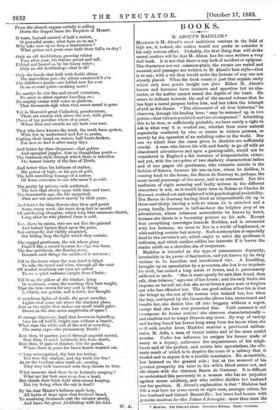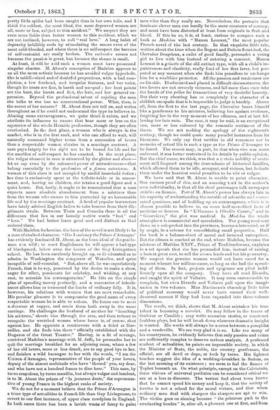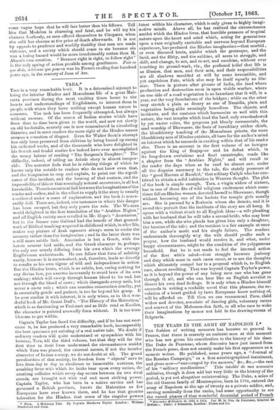BOOKS.
M. ABOUT'S MADELON.*
MADELON is M. About's most ambitious venture in the field of high art, if, indeed, the author would not prefer to consider it his only serious effort. Probably, the first thing that will strike casual readers will be that M. About has for once written a very dull book. It is not that there is any lack of incident or epigram The characters are not common-place, the events are varied and unusual, and passages are written in M. About's best style—that is to say, with a wit that would make the fortune of any one not already placed. What the book wants is just that organic unity which only true poetic insight can give. Either M. About's heroes and heroines have instincts and appetites but no cha- racter, or the author cannot sound the depths of the heart. He seems to indicate towards the end of the second volume that he has kept a moral purpose before him, and has taken the triumph of evil as his theme. "The denouement of all true histories," he observes, through his leading hero, " may be summed up in two points—that virtueis punished and vice recompensed." Admitting this to be true, or sufficiently probable, we have surely a right to ask in what way it is worked out., whether from some natural superiority conferred by vice or innate in vicious persons, or merely by the operation of an unfailing order in the world. Nor can we admit that the cases given in .Madelon are sufficiently crucial. A man who leaves his wife and family to go off with an abandoned adventuress and open a gaming-table, would not be considered in England a fair instance of irreproachable virtue ; and yet, with the exception of two shadowy characterless ladies and of one pagan old gentleman, who commits suicide in the fashion of Seneca, because his son-in-law, whom he dislikes, is coming back to the house, the Baron de Guernay is, perhaps, the moat moral personage of the story, and is so esteemed. But this confusion of right meaning and faulty actions in the different characters is not, as it would have been in Balzao or Charles de Bernard, worked out and explained with psychological probability. The Baron de Guernay having lived an irreproachable life up to three-and-thirty, having a wife to whom he is attached and a young family, becomes in half-an-hour the helpless prey of an adventuress, whose infamous antecedents he knows by heart, because she faints in a becoming posture on his sofa. Except that everything converges towards Madelon, and is connected with her fortunes, we seem to live in a world of haphazard, or with nothing certain but misery. Such a conception is especially fatal to the novelist's art, which ought to solve the problems it indicates, and which neither edifies nor interests if it leaves the reader adrift on a shoreleas sea of conjecture.
Madelon is intended as the type of consummate depravity, irresistible in its power of fascination, and yet known by-its very victims to be heartless and unredeemed vice. A foundling, brought up on speculation by a procuress, she has been in prison for theft, has ruined a long series of lovers, and fa passionately addicted to cards. " She is more openly for sale than bread, than salt, than tobacco," says one of her lovers ; and the only limits she imposes on herself are that she never loves a poor man or forgives one who has offended her. The one good action of her life is that she brings up the son of the woman who trained her, but when the boy, corrupted by the licence she allows him, turns round and insults her, she shakes him off into beggary without a regret, except that she has ever protected him. Voila comment is ciel recompense lea bonnes actions! she observes characteristically— and resolves not to tempt Heaven any more. By way of variety and having found her lovers keep away from the house when she is ill with scarlet fever, Madelon marries a provincial million- naire, M. Jeffs, a man of brutal habits and of the most sordid avarice. Under her influence he resigns his former trade of usury to a deputy, cultivates the acquaintance of his neigh- bours and of the prefect, and enters into speculations, the ulti- mate result of which is to deprive the town of a railway that it needed and to expose it to a terrible inundation. He, meanwhile, has fattened on the general ruin ; but at the moment of his greatest prosperity the taint in his wife's blood comes out, and she elopes with the virtuous Baron de Guernay. It is difficult to understand this perversity in a woman who has no prejudice against secret adultery, and who neither dislikes her husband nor her position. M. About's explanation is that "Madelon had felt a real love for some seven or eight men, amongst others, for her husband and Gerard Bonneville ; her heart had beaten with genuine emotion for the Prince d'Armagne; more than once the
* Madelyn. Par Edmond About. Deuxibme Edition. POLS: Ilacbette. pretty little spider had been caught thus in her own toils, and I think the coldest, the most blasé, the most depraved women are all, more or less, subject to this accident." We suspect they are even more liable than better women to this accident, which we are not inclined, however, to call " real love." A long habit of depravity infallibly ends by stimulating the senses even of the most cold-blooded, and where there is no self-respect the barriers of self-restraint are easily broken. The esclandre comes not because the passion is great, but because the shame is small.
At least, it will be said such a woman must have possessed singular charms. M. About's conception of Madelon appears to us all the more artistic because lie has avoided vulgar hyperbole. She is middla-sized and of doubtful proportions, with a bad com- plexion, a low forehead, and irregular features, and her voice, though its tones are fine, is harsh and unequal ; her best points are the bust, the hands and feet, the hair, and her general ex- pression. Beyond the professional talent of cajoling the men she talks to she has no conversational power. What, then, is the secret of her success? M. About does not tell us, and writes throughout as if he could not understand the type he believes in. Abating some extravagances, we quite think it exists, and we attribute its influence to causes that bear more or less on the mysteries of the whole Hetairic profession, though they are often overlooked. In the first place, a woman who is always in the market, who is in the first rank, and who can afford to wait, will naturally command higher terms from a succession of lovers than a respectable woman obtains in a marriage contract. A man pays largely for the right not to be bound for life and for the sacrifice of self-respect he has exacted. In the next place, the vulgar element in men is attracted by the glitter and show— let us say even by the enhanced power of attractiveness—that belong essentially to the profession of a femme entretenue. A woman of this class is not occupied by sordid household duties ; her time is, exclusively spent at the toilette-table or in amuse- ment, and, having no children, she retains a good figure and a quiet house. But, lastly, it ought to be remembered that a man expects more absolute abandonment from a mistress than from the woman who comes to him protected by an honourable life and by the marriage contract. A herd of popular instructors have lately advised English ladies to take lessons from their ille- gitimate rivals. Between Thais and Cornelia there is all the difference that lies in our homely native words "lust" and "love." We had better leave good and evil distinct as God ordered them.
With Madelon forheroine, the hero of the novel is not likely to be a man of exalted character. "His Iusolency the Prince d'Armagne" has evidently fascinated M. About, as. the beau ideal of the gentle- man run wild ; to most Englishmen he will appear a had type of. blackguard, below even the heroes of the Guy Livingstone school. He has been carelessly brought up, so ill educated as to admire in Washington the conqueror of Waterloo, and quite incapable of self-restraint. ‘. But, above all, he was superlatively French, that is to say, possessed by the desire to make a show, eager for .effect, passionate for celebrity, and wishing, at any cost, to astonish his contemporaries." He hits on the simple plan of spending money profusely, and a succession of inherit- ances allows him to transcend the limits of ordinary folly. It is, however, his relations with women that are most remarkable. His peculiar pleasure is to compromise the good name of every respectable woman he is able to seduce. He forces one to meet a danseuse at supper, and sends them both away in the same carriage. He challenges the husband of another for "insulting his mistress," shoots him through the arm, and then refuses to recognize the wretched woman whose home is, of course, shut against her. He appoints a rendezvous with a third at Mar- seilles, and she finds him there " officially established with the Dugazon of the Great Theatre." Having, in a fit of revenge, contrived Madelon's marriage with M. Jeffs, he persuades her to quit the maniage breakfast for an adjoining room, where a few of her old lovers, more or less drunk, are to say good bye to her, and finishes a wild harangue to her with the words, "I am the Citizen d'Armagne, representative of the people of your lovers, deputy of the absent multitude who have thoued' you, my dear, and who have not a hundred francs to dine here." This man, by turns crapulous, by turns maudlin, but always vulgar and insolent, is to M. About the prince of "la jeunesse doree," the representa- tive of young France in the highest ranks of society.
We do not for a moment believe that the Prince d'Armagne is a truer type of actualities in French life than Guy Livingstone, to revert to our first instance, of upper class rowdyism in England. In both cases there has been a lavish waste of fancy to paint
men viler than they really are. Nevertheless, the portraits that fascinate clever men can hardly be the mere creatures of ecstacy, and must have been distorted at least from originals in flesh and blood. If this be so, it is, at least, curious to compare suck a. book as Madden with " Matson Lescaut," the most popular French novel of the last century. In that exquisite little tale, written about the time when the Regent and Dubois flourished, the Chevalier Desgrieux, a cadet of good family, persuades a young girl to live with him instead of entering a convent. Manua Lescaut is a grisette of the old extinct type, with all a child's im- pulsiveness and elasticity, really fond of her first lover, but pre- pared at any moment when she finds him penniless to exchange him for a wealthier protector. All the passion and tenderness are on his side. Ill-educated and placed in difficult circumstances, the two lovers are not severely virtuous, and fall more than once into the hands of the police for transactions of rely doubtful honesty. But their very cheating has so completely the character of a childish escapade that it is impossible to judge it harshly. Above all, from the first to the last page, the Chevalier bears himself like a gentleman to his mistress, believing her against evidence, forgiving her in the very moment of her offences, and at last fol- lowing her into ruin. The case, it may be said, is an exceptional one, more or less coloured by the romantic sentiment of the times. We are not making the apology of the eighteenth century, though we could quote many parallel instances from its literature. We only say that neither in old romances nor in memoirs of actual life is such a type as the Prince d'Armagne to be found. The reason may, in part, be that when vice was more universal, it was better restrained in its details by public opinion. But the chief cause, we think, was that a esnain nobility of senti- ment still lingered among the descendants of historical families, which allowed them to be idle, arrogant, and vicious, but forbade them under the heaviest social penalties to be vile or vulgar.
We have said that M. About is unable to paint character. One curious proof of this, and an amusing trait in the author's own individuality, is that all his chief personages talk newspaper articles on finance. Part of M. About's power has always lain in his capacity of understanding the outside of scientific and econo- mical questions, and of building up an extravaganza, which it is almost possible to believe in, on some half-accredited facts of medicine or finance. In " L'Homme ]'Oreille Cassee," and in " Genevieve," the plot was medical. In Haddon the whole atmosphere is commercial and speculative. The young roué sent down as a sub-prefect into the provinces, becomes interested, as if by magic, in a scheme for consolidating small properties. Half the book is a balance-sheet of moral and immoral enterprises. But the climax is reached at the end, where Madelon, become the mistress of Mathias XXIV., Prince of Teufelsschwanz, explains in a set speech that she has persuaded him, instead of raising a loan at great cost, to sell the crown lands and tax his peasantry. We suspect the genuine woman would not have cared for a moment whence her millions came, so long as she had the spend- ing of them. In fact, projects and epigrams are piled indif- ferently upon all the company. They have all read Ricaido, and caught the spirit of Voltaire. It may seem unreasonable to complain, but even Ricardo and Voltaire pall upon the imagia nation in two volumes. Miss Martineau's charmiug little tales of political economy would never have earned their well- deserved success if 'they had been expanded into three-volume dimensions.
The result, we think, shows that M. About mistakes his true talent in becoming a novelist. He may follow in the traces of Gulliver or Candide ; may write sensation stories, or construct faultless plays, but he will break down wherever dramatic insight is wanted. His works will always be a cross between a pamphlet and a vaudeville. We are very glad it is so. Like too many of his countrymen, be evidently believes that only passion and crime are sufficiently complex to deserve serious analysis. A professed student of actualities, he paints an impossible society, in which the Minister of State, the noble, the country gentleman, the official, are all devil or dupe, or both by turns. His lightest touches suggest the idea of a wedding-breakfast in Sodom, on the last morning of its existence ; we seem to feel the flames of Tophet beneath us. On what principle, except on the Calvinistic, these visions of universal perdition can be considered ethical we are at a loss to discover. The veriest fool about town knows that he cannot spend his money and keep it, that the society of lorettes is not a school for the moral -virtues, and that when ordinary men deal with sharpers the sharpers are apt to win. The victim goes on sinning because " the primrose path to the everlasting bonfire " is, after all, a pleasant one at first, and from some vague hope that he will fare better than his fellows. Tell him that Madelon is charming and fatal, and he will try his chances fearlessly, as men offered themselves to Cleopatra when she sold her charms at the price of death afterwards. It is not by appeals to prudence and worldly timidity that men are made virtuous, and a society which should cease to sin because sin was a losing hazard would be more irreclaimably rotten than M. About's own creation. " Because right is right, to follow right" is the only spring of action possible among gentlemen. Fais ce que doffs, advienne que pourra was its French reading four hundred years ago, in the century of Joan of Arc.
































 Previous page
Previous page